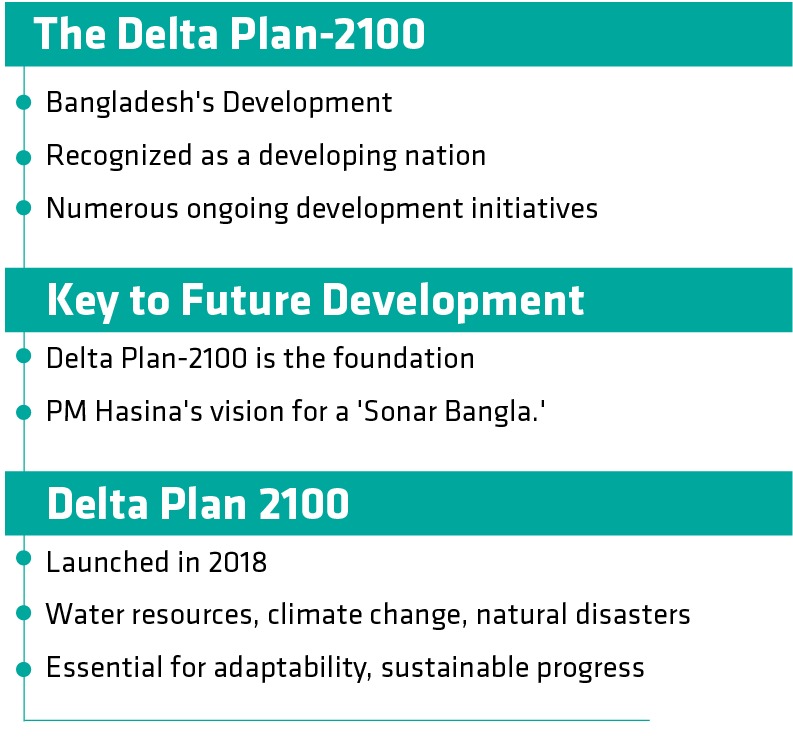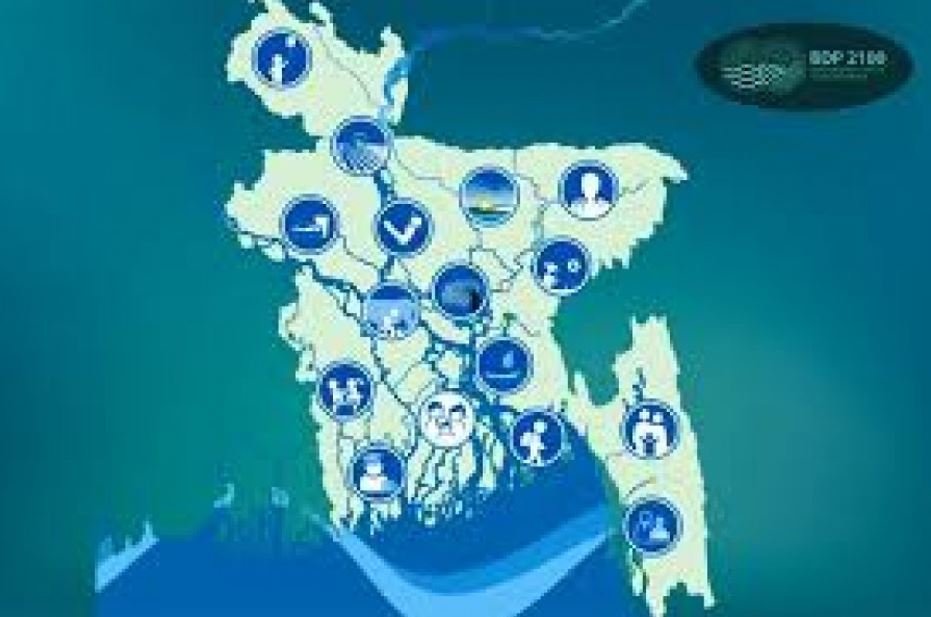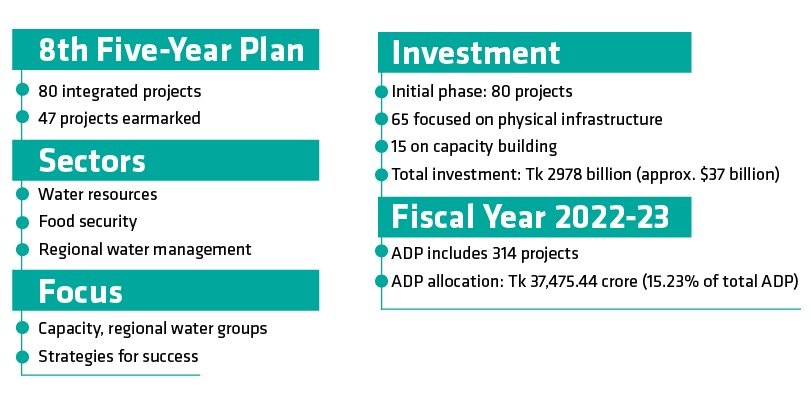Bangladesh Delta Plan (BDP) 2100 is a comprehensive, long-term mega-plan that unifies all delta-related sector plans and policies. It includes a vision and strategies that integrate these plans for sustainable, actionable interventions and a clear implementation roadmap.
The present administration has undertaken numerous development initiatives for our country and is steadfast in its efforts to promote progress. Among these various development endeavors, the Delta Plan-2100 holds the key to Bangladesh’s future development. Prime Minister Sheikh Hasina has granted her approval to the nation’s inaugural centenary master plan, known as the ‘Bangladesh Delta Plan-2100,’ with the aim of creating a sustainable ‘Sonar Bangla,’ as envisioned by the Father of the Nation, Bangabandhu Sheikh Mujibur Rahman.
You can also read: Evolution of Bangladesh-Denmark Relations: Sustainable Development Partners
In 2018, the government initiated the Delta Plan 2100 to safeguard the long-term management of the country’s water resources and to mitigate the impact of climate change and natural disasters. Given Bangladesh’s susceptibility to these challenges and the effects of climate change, sustainable progress necessitates the ability to adapt to climatic variables. Indeed, addressing such challenges requires the effective implementation of the government’s visionary Delta Plan 2100.

Goals of the Plan
To bring this vision to fruition, the Bangladesh Delta Plan 2100 sets its sights on achieving “sustainable, long-term water and food security” by addressing challenges like natural disasters, climate change impacts, and other delta-related issues. This is to be accomplished through the adoption of resilient, integrated, and adaptable strategies, as well as by establishing fair governance in water resource management, with a dual focus on economic growth and environmental stability.
BDP 2100 approach to long term goals:
Higher level goals:
- Eliminating extreme poverty by 2030.
- Attaining the status of an upper-middle-income country by 2031.
- Achieving the designation of a Smart Prosperous Country by 2041.
BDP 2100 specific goals:
- Establish resilience against floods and climate-related disasters.
- Improve water security and optimize water utilization.
- Promote sustainable management of river systems and estuaries.
- Preserve wetlands and ecosystems while encouraging responsible usage.
- Foster effective institutions and equitable governance for water resource management within and across borders.
- Attain optimal and integrated utilization of land and water resources.
Strategies have been devised at three distinct levels:
National Level:
- Flood Risk Management
- Freshwater Management
Hotspot Level:
- Coastal Zone (27,738 sq. km)
- Barind and Drought-Prone Areas (22,848 sq. km)
- Haor and Flash Flood Areas (16,574 sq. km)
- Chittagong Hill Tracts (13,295 sq. km)
- River Systems and Estuaries (35,204 sq. km)
- Urban Areas (19,823 sq. km)
Cross-Cutting Issues:
- Sustainable Land Use and Spatial Planning
- Agriculture, Food Security, and Livelihood
- Trans-boundary Water Resources Management
- Dynamic Inland Water Transport
- Blue Economy
- Renewable Energy
- Earthquake Preparedness
Partnership with the Netherlands
- Memorandum of Understanding (MoU) between the Government of Bangladesh and the Netherlands in May 2012 for the formulation of Bangladesh Delta Plan 2100.
- Memorandum of Understanding (MoU) between the Government of Bangladesh, the Netherlands, and the World Bank on 16 June 2015, focusing on enhancing water management in the Bangladesh Delta.
Delta Plan Implementation Status
Bangladesh Delta Plan 2100 was accurately crafted over four and a half years of dedicated effort. Now, nearly five years have elapsed since its approval by the NEC on September 4, 2018. It’s imperative to measure the progress made in implementing this master plan during this period.
Establishment of the Delta Wing
The General Economics Division in the Planning Commission leads coordination and oversight of Bangladesh Delta Plan 2100. This includes expediting implementation, maintaining currency, and overseeing assessments and monitoring. To fulfill this role, a specialized ‘Delta Wing’ is delineated within the plan. On January 2, the Ministry of Public Administration endorsed the proposed structure for this Delta Wing.
Following this, an interim Delta Wing was formed within the General Economics Department by the Planning Department on February 16, ensuring the smooth implementation of the Bangladesh Delta Plan 2100.

Policy Brief for Delta Fund Establishment
For financing the Bangladesh Delta Plan 2100, a fund, the ‘Bangladesh Delta Fund,’ has been proposed. The policy brief recommends following the current project-based allocation and expenditure method under the Annual Development Programme (ADP), rather than creating a separate fund with a unique accounting system.
Capacity development
As part of the ‘SIBDP 2100’ project, a training module has been developed to enhance the skills and knowledge of officials from relevant Ministries, Departments, and Organizations for effective Delta Plan implementation. Thus far, 31 training sessions have been conducted, with a total of 961 officials from delta-related entities receiving instruction on evaluating Delta Planning 2100, managing Bangladesh’s delta adaptation, advanced adaptation delta management, and the utilization of meta models.
Formation of Delta Governance Council
As part of the ‘SIBDP 2100’ project, a training module has been developed to enhance the skills and knowledge of officials from relevant Ministries, Departments, and Organizations for effective Delta Plan implementation. Thus far, 31 training sessions have been conducted, with a total of 961 officials from delta-related entities receiving instruction on evaluating Delta Planning 2100, managing Bangladesh’s delta adaptation, advanced adaptation delta management, and the utilization of meta models.
Project/Program Selection Committee
To oversee the selection and evaluation of projects and programs within the ‘Bangladesh Delta Plan-2100’ investment program, an Inter-Ministerial Project/Programme Selection Committee led by the Member of the General Economics Department has been established. This committee is primarily responsible for identifying and monitoring specific projects and programs for the Delta Plan.
Establishment of Delta Knowledge Portal/Repository
A vital component of adaptive delta management is the creation of a comprehensive knowledge repository, facilitated by the Delta Knowledge Portal established within the General Economics Department. This digital platform stores information related to projects within the Bangladesh Delta Plan 2100, including those implemented, ongoing, and planned, and offers various resources, such as the Delta Bayes Line Study, to support these initiatives.
Inaugural International Delta Conference Hosted
A two-day international conference in Dhaka, titled ‘Bangladesh Delta Plan 2100 International Conference: Issues and Challenges of Implementation,’ was organized by the GED and the Netherlands Embassy in Bangladesh on May 26-27. The conference aimed to share information about the Bangladesh Delta Plan 2100, covering its strategy, implementation, financing, and priorities, with a focus on encouraging domestic and foreign investments and fostering knowledge exchange. Prime Minister Sheikh Hasina inaugurated the event, with support from international organizations including the World Bank, ADB, JICA, and more.

Reflections on 8th Five Year Plan
The implementation of the Bangladesh Delta Plan 2100 holds significant importance within the framework of the Eighth Five-Year Plan. Out of the 80 projects integrated into the investment plan for the Bangladesh Delta Plan 2100, 47 projects, encompassing sectors like water resources, food security, and regional water management, have been earmarked for execution during the Eighth Five-Year Plan period. Additionally, the plan underscores the development of institutional capacity and the activation of regional water groups to support the Bangladesh Delta Plan 2100’s realization, accompanied by proposed implementation strategies.
The initial phase of the Bangladesh Delta Investment Plan entails 80 projects, comprising 65 focused on physical infrastructure and 15 related to institutional capacity building and research. The total capital investment for these projects amounts to 2978 billion taka, approximately 37 billion US dollars. In the fiscal year 2022-23, the Annual Development Program (ADP) encompasses 314 projects aligned with the investment plan for the Bangladesh Delta Plan 2100 and its strategic objectives. The total allocation within the ADP for these 314 projects is Tk 37,475.44 crore, equivalent to 15.23 percent of the ADP allocation.
Recommendations of the master plan
The comprehensive master plan proposes the excavation of waterlogged canals, rivers, and waterways as a key measure for addressing waterlogging and flood control. It places a strong emphasis on addressing issues like unplanned urbanization on illegally encroached floodplains and the industrialization of rivers and water bodies within the delta.
One of the pivotal strategies outlined in the Bangladesh Delta Plan 2100 for ensuring water availability during the dry season is the establishment of water storage facilities to retain monsoon water. Furthermore, the plan prioritizes the development of reservoirs through river and canal dredging, enhancing surface water resources within the country.
Bangladesh boasts numerous rivers, canals, and estuaries that can serve as natural reservoirs. In cases where necessary, the selection of optimal reservoir locations will be guided by feasibility studies. These reservoirs can be excavated and deepened to store water from September to October, providing essential resources for irrigation and fisheries during the dry season.
The Bangladesh Delta Plan 2100 stands as an all-encompassing and holistic master plan. It is not just a blueprint but a valuable legacy from the present generation to the generations that will follow.


